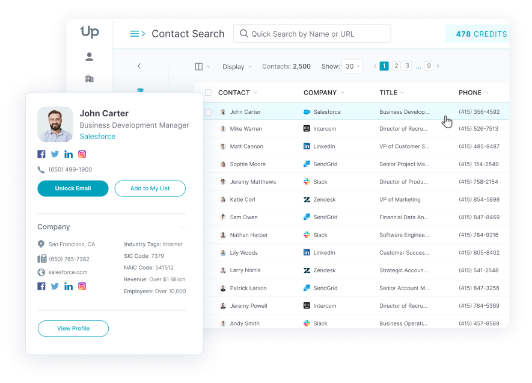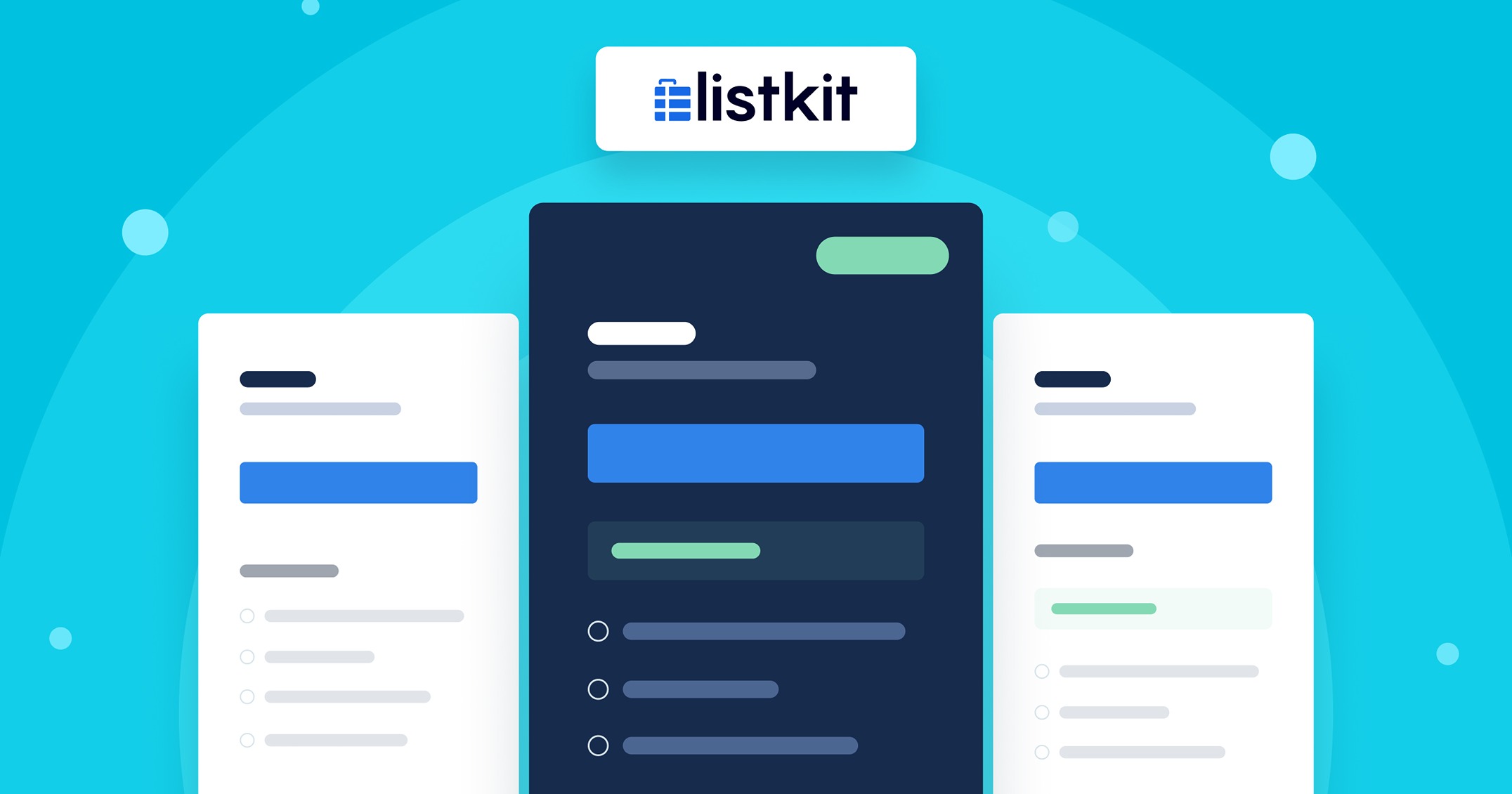To shorten your sales cycle, show a clear value prop, focus on decision-makers, and handle objections early. Knowing your average sales cycle is key as it allows you to measure your sales processes and identify areas to improve.
Use automation and data to find the best leads and create urgency while tailoring your pitch to the prospect. Build social proof, make signing contracts easy and simplify pricing to speed up decisions.
📌 On a time crunch? Pinpoint the highest-potential leads using UpLead’s data enrichment and intent data tools. Try UpLead and get 5 free validated B2B emails.
In this article you’ll learn how to use these (and other) tactics.
1. Show a Clear Value Prop
Show how your product or service solves a problem for your customer. That will shorten your sales cycle as you help people immediately see the benefits. Your message should speak directly to them, be different from what the competition offers and show them the results they’ll get. Keep it simple and test it often, and make changes based on customer feedback.
2. Target the Right Decision Makers
Find the right people early. Start by using tools like LinkedIn or list building tools such as UpLead to find managers and executives at your target companies.

Once you find them, focus on building relationships through personalized outreach. That way, you’ll get quicker decisions and save time by not wasting time on the wrong contacts.
3. Handle Objections Early
Address objections as they come up. Cost, timing or fit can slow things down if ignored. You can avoid that by knowing what your prospects are worried about and being ready with clear answers. When you address their concerns early you build trust, remove obstacles and speed up decisions.
4. Automate Your Sales Process
Automation will shorten your sales cycle by taking care of the repetitive tasks like sending follow up emails and updating customer data. A well-oiled sales pipeline is key to avoiding bottlenecks and getting leads moving through the different stages. Tools like CRM platforms track customer info, while email tools manage outreach and follow-ups. Using these tools’ll create a smooth workflow so your sales team can focus on closing deals faster.
5. Prioritize High-Quality Leads with Data
To focus on the best leads use data analytics and build a lead scoring system. Understanding customer needs and organizing data will get prospects through the B2B sales funnel and from potential leads to closed deals.
Track key actions like website visits, content views and email opens. By scoring and grouping your leads, you can target those who are most likely to buy and shorten the sales cycle to get faster results.
6. Create Urgency
Getting prospects to act fast is key to shortening the sales cycle. You can do that by using psychological triggers like FOMO and scarcity.
Show that your offer is limited or give a time-sensitive discount. This will not only make your offer more appealing but also speed up the decision. Point out the benefits of acting now and the risks of waiting.
7. Customize Your Pitch to the Prospect
Make sure your pitch addresses the prospect’s needs. Tailoring your message builds trust and makes them see your solution as fitting for their specific challenges. Start by researching their company, listen actively during conversations and tweak your message to solve their problems. Match your content to their goals so they can see the value quickly.
8. Use Social Proof and Case Studies
Show real-life results. Sharing those results will help potential clients trust you and make quicker decisions. Use clear testimonials and detailed examples to prove your results and speed up their buying process.
9. Offer Easy Contract Signing Options
Providing your customer with a way to sign contracts fast is key to shortening the sales process. By using e-signatures and making contracts mobile-friendly, you make signing easier, stress-free and close deals faster. This easy way keeps everything on track and helps you close agreements quickly.
10. Simplify Your Pricing
Complicated pricing will make buyers pause. With clear and easy-to-understand pricing, you help customers see the costs clearly and decide faster.
Bundle your offers and use visual aids like charts to make it even easier. Provide flexible payment options and customers will feel more confident to move forward. A simple plan builds trust and leads to more sales.
11. Consultative Selling
Take time to understand your client’s needs. Start with discussions to learn their pain points. Then work with them to build solutions that meet those needs.
When you show them the value of your offerings and use mutual action plans they will decide faster and close sooner.
12. Agree on the Next Steps
Make sure you both agree on next steps after each meeting to shorten the sales process. That keeps you and your prospect aligned and prevents delays. Review key points and agree on actions to take. A follow up summary will keep everything on track and get you to close faster.
13. Improve your Follow Up
Pay attention to timing and personalization. Try to respond within 5 minutes after a potential customer reaches out. Continue the conversation with timely messages. Tailor what you say based on past interactions but don’t overwhelm them.
14. Use CRM to Track and Manage Leads
CRM tools shorten the sales cycle by keeping all lead information in one place, automating tasks and follow-ups. By choosing and integrating the right sales tools, businesses can streamline their process and align with the buying cycle.
They let you track customer interactions, organize your sales process and make decisions based on real time data. By automating follow up emails and data entry you save time and reduce mistakes so your team can focus on closing the best leads faster.
15. Sales and Marketing Alignment
Get your sales and marketing teams working together. Sales managers use sales cycle metrics to create accurate sales forecasts and address areas for improvement. When they are in sync, it creates a straight line for the buyer to buy what they need. You can do this by having regular meetings, shared buyer personas and tools that ensure consistent messaging and teamwork.
16. Shorten the Sales Meeting
Merge meetings by combining key discussions and only invite the top decision-makers. Keep these sessions focused by setting clear goals and sticking to the time limit. Use tools to communicate quickly and follow up via email so everyone is aligned.
17. Focus on the Buyer’s Journey
Shorten the sales process by understanding what your buyer goes through. When you know each stage—from learning about your product to making a decision—you can see the issues and adjust your approach. Map those stages and match your sales process to what your buyer needs. That will increase engagement and speed up the decision and the sales cycle.
18. Use Storytelling in Your Pitch
Sharing stories in your pitch shortens sales by creating an emotional connection with your prospects. When you tell relevant stories you engage customers more and make your pitch more persuasive and memorable.
For example showing how your product solved real problems for another client can address objections and build trust. This will not only speed up the sales process but also set the stage for long term relationships with your customers. So use the power of storytelling to make your pitch a journey that really connects.
19. Build Trust-Based Relationships
To shorten the sales process, focus on making real connections. When people trust you they buy faster. Show you care about their needs, listen closely and be honest about what you offer. Check in with them often and keep each interaction personal. If you always bring value you’ll see things move fast.
20. Add Value to Every Interaction
Adding value in every interaction is key to shortening your sales process. From the start make sure each step meets the prospect’s needs.
Early on, focus your message on their challenges. As you progress, offer tailored demos that show clear benefits for them. This builds trust, keeps them interested and helps close deals faster.
21. Get Ahead of Deal Blockers
To avoid deal blockers and keep the sales process smooth, you need to anticipate common obstacles like budget constraints, decision-maker approvals, and unexpected security checks.
Start talking to key stakeholders early, explain the value of what you’re offering and keep communication open. Simplify the process, be flexible, and work through any issues that arise.
22. Clean and Update Your CRM Regularly
When your data is up to date, you spend less time searching and more time closing deals. To do this remove duplicates, update records after each interaction and audit the database regularly. That will keep you organized, help you prioritize leads and speed them through the funnel.
23. Use Incremental Closes
Speed up the sales process by getting small commitments from your customer step by step instead of asking for everything at once.
This reduces pressure and builds trust so they feel more comfortable. For example, start with a trial, offer a demo, or suggest a basic plan before offering more options.
Follow up on those early steps and you can introduce upgrades and extra features and guide your customer to a full agreement. This keeps the momentum going and makes the sales process smoother.
24. Train Your Sales Team Continuously
Keep training your team. Minimizing the admin burden on sales reps allows them to focus on high value activities which will lead to better sales outcomes and a shorter sales cycle.
Use workshops, role playing and webinars to upskill them. That will help them close deals faster and with more confidence. Stay up to date with the latest methods and adjust to market changes through continuous learning. That will build their confidence and make the sales process quicker and more effective.
25. Use AI-Driven Insights
AI tools like predictive analytics and lead scoring can help you improve your sales by analyzing big data. These tools will help you predict trends, find high value leads and understand what your customers want.
By using these AI powered insights you can make decisions faster and create more targeted strategies which will speed up the sales process.
26. Bundle
You can help your prospects decide faster by meeting multiple needs at once. When you bundle solutions, they can see the total value without comparing products separately. That will increase perceived value and speed up decisions and shorten the sales cycle.
27. Use Testimonials From Similar Industries
Share testimonials from your industry. That will build trust quickly. People feel more confident when they see your solution works for others in their own industry.
Ask happy clients directly or use simple surveys to gather testimonials and feature them in your sales content to show clear results and address concerns. That will make their decision faster and easier.
28. Create an Ideal Customer Profile
When you know your ideal customer, you can focus on the leads that matter and speed up your sales process.
Start by studying your best customers and understand what makes them unique, what problems they have and what they need. Write that down and check it regularly to make sure it matches your business goals.
29. Create a Structured Pre-Boarding and Onboarding Process
A clear pre-boarding and onboarding process is key to keeping customers and speeding up your sales. By guiding new users through simple steps, you show them the value of the product and reduce the chance of losing them.
Start by setting clear goals. Then create a detailed list of tasks. Offer personalized training and assign an expert to each customer. Regular check-ins and feedback will improve the process and lead to faster sales.
Why Should I Shorten the Sales Cycle?
Closing faster means more sales and better business. Quicker deals means you can do more transactions and get cash in faster so you can re-invest in your business sooner.
A faster sales process reduces long negotiations. That means your sales team can focus on quality leads and close more deals instead of getting stuck in long processes. The result? Better resource allocation and a productivity boost.
When customers experience a seamless and fast sales process their satisfaction goes up. They like timely responses and solutions which can lead to repeat business and word of mouth. Happy customers also improve your brand reputation giving you an advantage in the market.
A shorter sales cycle also helps you to adapt to market changes faster. You can adjust your strategies and respond to new trends or customer needs, making you more agile. That makes you a leader and attracts more potential customers.
An efficient sales process also boosts sales team morale. Small wins make your team feel more productive and motivated. That makes them perform better and lead to more sales success.
Lastly, a shorter and more predictable sales cycle makes it easier to forecast sales and plan resources. With a streamlined process you can allocate time, budget and people better and focus on high value opportunities. That will maximize your returns and help you spot and deal with risks.
In short, speeding up your sales process means more revenue, better customer satisfaction and more efficiency and a stronger position in the market and ability to adapt to change.
What Are the Common Mistakes That Lengthen the Sales Cycle?
If you want to close faster there are mistakes to avoid. Here are the key areas to watch:
- Complex Sales Steps: Too many steps slow progress. When too many people are involved or decisions take too long, deals stall. Simplify your steps to move faster.
- Unclear Value: If you’re not clearly showing how your product or service helps decision-makers may hesitate. They need to see the value right away. Make sure you present this upfront.
- Delaying Decision-Makers: Waiting too long to bring in key decision-makers can stretch out talks and delay approvals. Involve them early to speed things up.
- Ignoring the Buyer’s Journey: If your approach doesn’t match the buyer’s stage you might miss important parts which can slow things down. Know where your buyer is and meet them there to keep moving forward.
- Late Objection Handling: If you wait too long to address concerns it can lead to long discussions and slow down the deal. Handle objections early to keep momentum.
- Poor Follow-Up: Weak follow-up can make prospects lose interest and turn to competitors. Consistent and timely communication is key to keeping your sales on track.
- Misusing Technology: Not using CRM tools or sales automation can waste time and miss opportunities. Use technology wisely to track and prioritize leads.
- Confusing Pricing: Complicated or unclear pricing can frustrate prospects and stretch out talks. Keep pricing simple and clear to avoid delays.
- Insufficient Sales Training: If your sales team isn’t well-trained they might struggle to communicate your product’s value or manage leads correctly and slow down the process. Make sure your team is ready at each stage.
- Weak Relationship Building: If you’re not building strong relationships trust becomes harder to gain which can delay closing. Focus on rapport and trust to create urgency.
- Chasing Unqualified Leads: Going after unqualified leads wastes time. Use lead-scoring methods and focus on high quality prospects to keep the process efficient.
FAQs
You can close deals faster without losing quality. Start by targeting decision-makers directly, handle objections early and use automation tools. Then you can move fast and keep your customers happy.
Closing faster can increase your conversion rates. When you move faster you reduce the opportunity for objections and focus on solid leads. These two things lead to better conversion rates.
You can absolutely shorten the sales process in complex B2B sales. First, know the buyer’s journey. Then use technology and build strong relationships. These two things will help you connect with decision-makers sooner, simplify communication and handle objections early. Then you can move faster and more efficiently.









